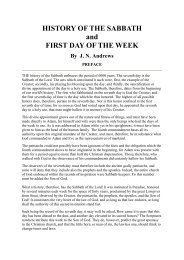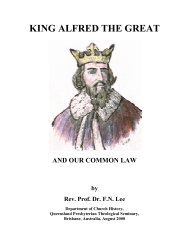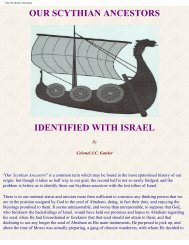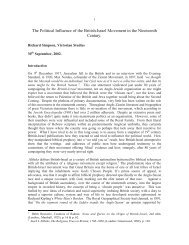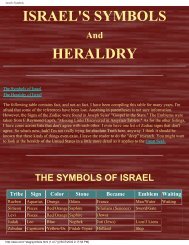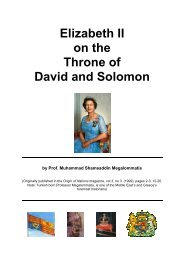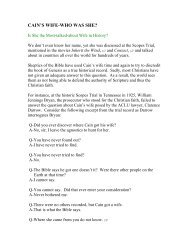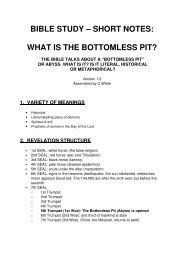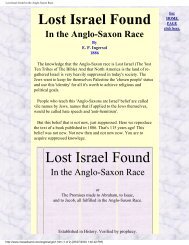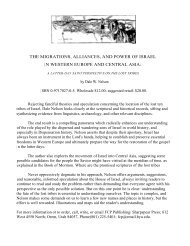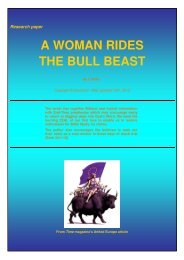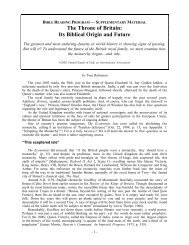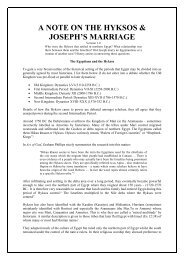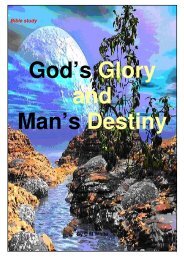CH. 6. COMMON LAW AMONG THE ANCIENT ... - Origin of Nations
CH. 6. COMMON LAW AMONG THE ANCIENT ... - Origin of Nations
CH. 6. COMMON LAW AMONG THE ANCIENT ... - Origin of Nations
Create successful ePaper yourself
Turn your PDF publications into a flip-book with our unique Google optimized e-Paper software.
tribes. He could impose no new law, nor demand extra-legal service. He was never alaw unto himself but always subject to the rule <strong>of</strong> law.The political bond, which seemed so loose, drew all its strength from a body <strong>of</strong> nationaltradition and a Universal Law Code. Separate and independent as the tribes were, allalike accepted the one Code which had been fashioned in the course <strong>of</strong> ages. The samelaw was recited in every tribal assembly.There were schools <strong>of</strong> lawyers to expound the law. Thereby, the spirit <strong>of</strong> the Irishfound national expression in a code <strong>of</strong> law showing not only a well and trulyextraordinarily acute and trained intelligence -- but also a true sense <strong>of</strong> equity.Scholars in their degrees ranked with kings and chiefs, and pr<strong>of</strong>essors sat by the highkingand shared his honours. It is in the exaltation <strong>of</strong> learning in the national life that wemust look for the real significance <strong>of</strong> Irish history -- the fine idea <strong>of</strong> a society loosely heldin a political sense, but bound together in a spiritual union.Under the competent leadership <strong>of</strong> trained and educated legal scholars, also the commonpeople themselves were deeply involved. As A.S. Green explains,#112# in Ireland everycommunity and every individual was interested in maintaining the law <strong>of</strong> the people andthe protection <strong>of</strong> the common folk. Irish land laws, in spite <strong>of</strong> all the changes thatgradually covered the land with fenced estates, actually preserved popular rightsthroughout all the centuries -- viz.: fixity <strong>of</strong> rates for the land; fixity <strong>of</strong> tenure; security <strong>of</strong>improvement.Rights <strong>of</strong> inheritance and due solemnities <strong>of</strong> election were accurately preserved. SaidSir John Davis, the English Attorney-General <strong>of</strong> Ireland under King James theFirst: “The Irish are more fearful to <strong>of</strong>fend the law than are the English -- or anyother nation whatsoever. No nation loves equity and justice better. The Irish aresatisfied to see it executed -- even against themselves.”That was certainly the case in Ancient Free Ireland, while under her own Brehon Law.Then, they were never 'feckless' -- nor were they a nation <strong>of</strong> rebels constantly 'against thegovernment' etc. Such perceptions about Irishmen must be attributed only to Ireland'slater reaction against the forceful imposition <strong>of</strong> foreign and by-then-divergent legalsystems upon her -- in relatively recent times.In his book Ireland, McCarthy records#113# that ancient Irish kings were surrounded bylawmakers, soldiers, musicians and poets. All such kings only presided over legislativeassemblies. The various kingdoms <strong>of</strong> Ireland were politically and militarily strong, andthe land was a centre <strong>of</strong> learning.The early rulers <strong>of</strong> Erin were Gaelic Celts with blond and reddish hair. They came toIreland about 350 B.C., carrying iron weapons that enabled them to subdue the earlierinhabitants. The latter were a Celto-Basque or Celtiberian people from northern Spainwho were armed with bronze.27



